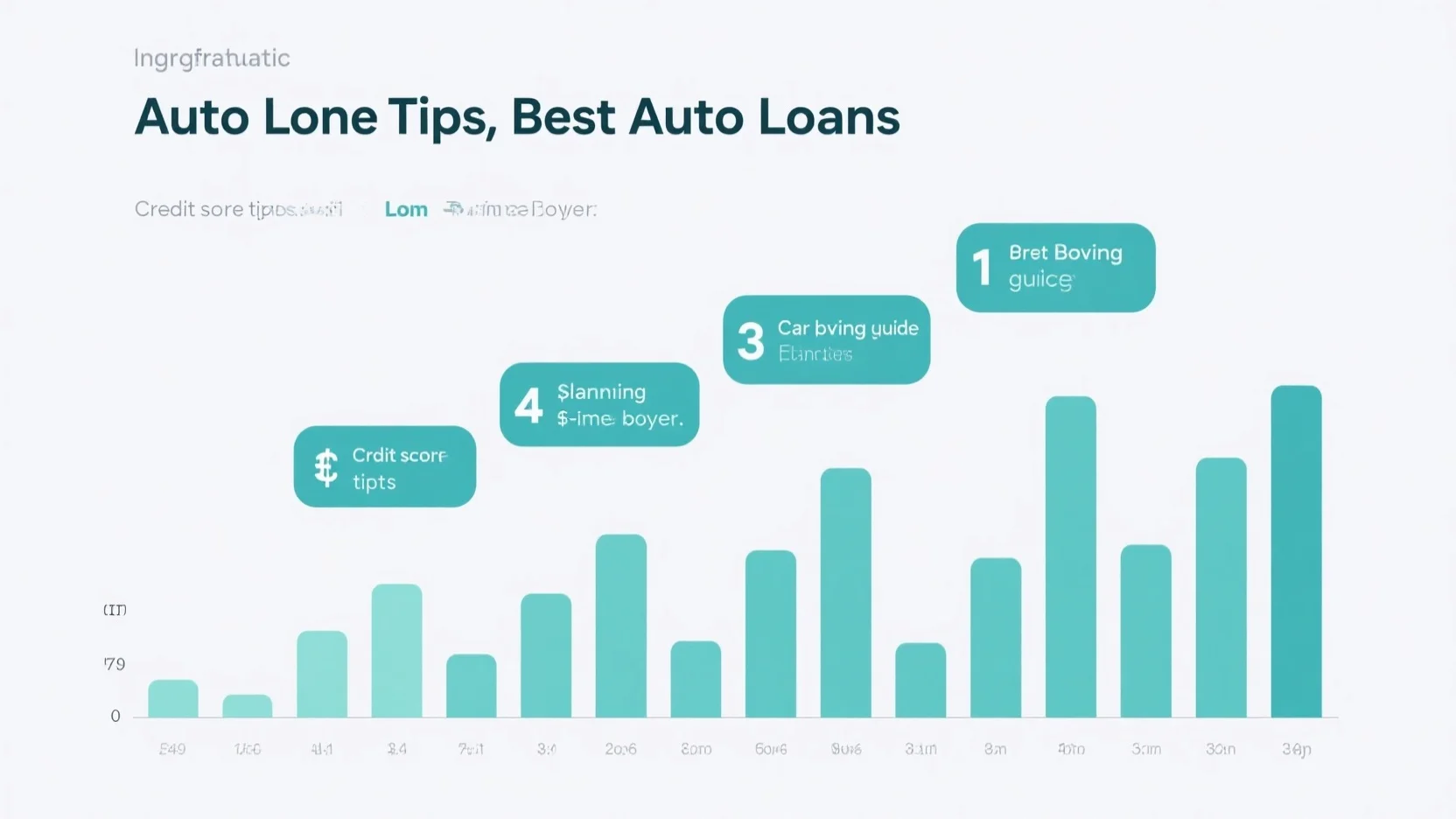
A Beginner’s Guide to Picking the Right Auto Loan

Image Source: pexels
Purchasing a car often represents a significant financial milestone. First-time buyers frequently face challenges, such as affording a vehicle or securing a loan with limited credit history. Checking credit scores becomes essential, as lenders base interest rates and loan terms on this factor. Exploring the best auto loans for first-time buyers can simplify the process.
Key Takeaways
- Look at your credit score before getting a loan. A good score can help you get lower interest rates.
- Make a budget that covers all car costs. Try to keep your car payment under 15% of what you earn each month.
- Save up for a bigger down payment. This can reduce your monthly payments and help you get better loan deals.
Assess Your Financial Readiness

Image Source: pexels
Check Your Credit Score and Report
Understanding your credit score is the first step toward securing a favorable auto loan. Lenders evaluate this score to determine your creditworthiness and set interest rates. A higher score often leads to better loan terms.
- The average credit score for new car loans is 755, while used car loans typically require an average score of 686.
- A score in the mid-600s is generally the minimum for obtaining favorable rates.
A poor credit score can result in higher interest rates because lenders perceive it as a risk. Borrowers with fair or poor credit should expect higher annual percentage rates (APR). Reviewing your credit report for errors and addressing them can improve your score before applying for a loan.
Create a Realistic Car Budget
Setting a realistic budget ensures you can afford the car and its associated costs. Start by calculating your monthly income and subtracting essential expenses like rent, utilities, and groceries. The remaining amount should cover your car payment, insurance, fuel, and maintenance. Experts recommend keeping your car payment below 15% of your monthly income.
Consider the total cost of ownership, not just the sticker price. This includes taxes, registration fees, and ongoing expenses. A well-planned budget helps first-time buyers avoid financial strain and choose the best auto loans for first-time buyers.
Save for a Down Payment
A substantial down payment reduces the loan amount and lowers monthly payments. It also demonstrates financial responsibility to lenders. For new cars, saving at least 20% of the purchase price is recommended. For used cars, aim for at least 10%.
A larger down payment can also help offset the impact of a lower credit score by reducing the lender’s risk. This strategy can lead to better loan terms and lower interest rates, making it easier to manage your finances in the long run.
Understand Loan Basics
Key Loan Terms to Know
Understanding key loan terms is essential for first-time buyers to make informed decisions. Comparing offers from different lenders requires attention to more than just the interest rate. The Annual Percentage Rate (APR) provides a clearer picture of the total loan cost, including fees and other charges. Buyers should also familiarize themselves with terms like principal, which refers to the loan amount borrowed, and amortization, which outlines how payments are applied to the principal and interest over time.
To prepare for the loan process, buyers should:
- Assess their financial situation, including credit score and debt-to-income ratio.
- Research various loan types to find the best fit for their needs.
- Save for a down payment to reduce monthly payments and improve loan terms.
Lenders evaluate creditworthiness based on income, assets, debts, and credit history. First-time buyers should also explore eligibility for special programs, such as government-backed loans or incentives for low down payments.
Fixed vs. Variable Interest Rates
Choosing between fixed and variable interest rates depends on financial goals and risk tolerance. Fixed-rate loans offer predictable monthly payments, making them ideal for buyers seeking stability. These loans protect borrowers from rising interest rates but may cost more over the loan’s life compared to variable rates.
| Type | Pros | Cons |
|---|---|---|
| Fixed Rate Loans | – Predictable monthly payments regardless of market changes. | – Less flexibility in terms. |
| – Payments do not increase during rising interest rates. | – More expensive over the loan’s life compared to variable rates. |
| Variable Rate Loans | – Payments decrease when interest rates fall. | – Payments increase when interest rates rise. | | | – Typically lower initial interest rates. | – Greater risk if interest rates rise quickly. |
Variable-rate loans, on the other hand, start with lower initial rates. However, they carry the risk of higher payments if interest rates increase. Buyers should weigh these factors carefully before deciding.
Loan Term Length and Its Impact
Loan term length significantly affects monthly payments and total interest costs. The average loan term for new vehicles is approximately 68.17 months, while used vehicles average around 67.15 months. Longer loan terms reduce monthly payments, making them more affordable in the short term. However, they result in higher total interest costs over time.
Shorter loan terms, while requiring higher monthly payments, save money in the long run by reducing interest expenses. Buyers should balance affordability with long-term financial benefits when selecting a loan term. For those seeking the best auto loans for first-time buyers, understanding this trade-off is crucial.
Best Auto Loans for First-Time Buyers

Image Source: pexels
Compare Lenders and Interest Rates
First-time buyers should compare lenders to find the most suitable auto loan options. Different lenders cater to varying needs, and understanding their offerings can help buyers make informed decisions.
| Lender Type | Description |
|---|---|
| Credit Unions | May offer first-time car buyer programs; membership required. |
| Big Banks | Existing customers may qualify; higher rates for first-time buyers. |
| Online Lenders | Generally less strict eligibility; higher interest rates for those with low credit history. |
| Loan Marketplaces | Platforms that connect borrowers with multiple lenders for better offers. |
| Captive Lenders | Financing through auto manufacturers’ finance companies; often have programs for students. |
Credit unions often provide competitive rates, while online lenders may offer flexibility for those with limited credit history. Loan marketplaces allow buyers to compare multiple offers in one place. Exploring these options ensures buyers secure the best auto loans for first-time buyers.
Get Pre-Approved for Better Control
Pre-approval offers significant advantages for first-time buyers. It provides clarity on borrowing capacity, enabling buyers to set realistic budgets before shopping. Pre-approval also locks in a fixed interest rate, offering stability during the car-buying process.
- Buyers with pre-approval can confidently shop for vehicles, knowing they have secured funding.
- It strengthens negotiation power at dealerships, potentially leading to better purchase prices.
- Pre-approval letters can facilitate discussions about in-house financing options.
Additionally, the pre-approval process evaluates credit scores and histories, helping buyers understand their financial standing. This knowledge is crucial for identifying the best auto loans for first-time buyers.
Avoid Dealer Financing Pitfalls
Dealer financing may seem convenient, but it often comes with hidden costs. Dealers sometimes mark up interest rates to increase profits, resulting in higher monthly payments. Buyers should approach dealer financing cautiously and compare it with external loan offers.
Separating the car purchase from financing negotiations can prevent confusion and ensure better deals. Buyers should also avoid being swayed by low monthly payment offers, as these often involve extended loan terms with higher total interest costs. By staying informed, first-time buyers can avoid common pitfalls and secure favorable loan terms.
Make Smart Decisions
Benefits of Shorter Loan Terms
Choosing a shorter loan term offers several financial advantages. Borrowers save money overall because they pay interest for a shorter period. Additionally, shorter terms often come with lower interest rates, sometimes reduced by as much as a full percentage point.
- Lower borrowing costs: Shorter terms reduce the total interest paid over the life of the loan.
- Faster ownership: Paying off the loan sooner allows buyers to own their vehicle outright much earlier.
While shorter terms require higher monthly payments, they provide long-term savings and financial freedom. First-time buyers should weigh these benefits against their monthly budget to determine if this option aligns with their financial goals.
Using a Co-Signer to Strengthen Your Application
First-time buyers with limited credit history or income may benefit from including a co-signer on their loan application. A co-signer, typically a trusted individual with strong credit, shares equal responsibility for repaying the loan.
- A co-signer improves the chances of loan approval by adding credit strength and income to the application.
- Lenders may offer better loan terms due to the added security provided by the co-signer.
- This option is particularly helpful for buyers seeking the best auto loans for first-time buyers.
A co-signer enhances the application by providing additional financial stability, increasing the likelihood of approval and favorable terms.
Separate Trade-In and Loan Negotiations
Combining trade-in discussions with loan negotiations can complicate the car-buying process. Buyers should treat these as separate transactions to avoid confusion and ensure transparency. Dealers may use trade-in values to offset perceived discounts on the loan, potentially leading to less favorable terms.
By negotiating the trade-in value independently, buyers can focus on securing the best loan terms without distractions. This approach ensures clarity and helps first-time buyers make informed decisions.
Final Tips and Next Steps
Look for Manufacturer or Dealer Incentives
First-time buyers should explore incentives offered by manufacturers or dealerships. These programs often make car ownership more affordable and accessible. Certain manufacturers provide first-time buyer programs, which may include special loans or rebates. These incentives aim to reduce the financial burden for new buyers.
Some common incentives include:
- Customer cash rebates
- Low-interest financing options
- Lease deals with favorable terms
- Dealer cash rewards or discounts
- Government-backed incentives for eco-friendly vehicles
- Non-cash perks like free vehicle upgrades or service packages
Buyers should inquire about these opportunities when visiting dealerships. Taking advantage of these offers can significantly lower the overall cost of purchasing a vehicle.
Read and Understand Loan Documents
Thoroughly reviewing loan documents is essential before signing any agreement. Buyers must ensure they understand all terms and conditions to avoid unexpected costs. Key elements to verify include:
- Proof of identity, income, and address
- Credit and financial history details
- Vehicle information and registration
- Down payment requirements
- Proof of insurance
Loan documents also outline the interest rate, loan term, and payment schedule. Buyers should confirm that these details match the agreed-upon terms. If any part of the document seems unclear, consulting a financial advisor or lender representative can provide clarity.
Tip: Never rush through loan paperwork. Taking the time to review ensures transparency and prevents future complications.
Plan for Ownership Costs Beyond the Loan
Owning a car involves more than just monthly loan payments. Buyers should account for additional expenses to avoid financial strain. These costs include insurance premiums, fuel, routine maintenance, and unexpected repairs. Registration fees and taxes also contribute to the total cost of ownership.
Creating a detailed budget that includes these expenses helps buyers prepare for long-term financial responsibilities. For those purchasing used vehicles, setting aside funds for potential repairs is especially important. Planning ahead ensures that car ownership remains a manageable and stress-free experience.
Note: Factoring in these costs early can prevent surprises and help maintain financial stability throughout the ownership period.
Financial readiness and understanding loan basics are essential for first-time buyers. Strategies like comparing lenders, checking credit scores, and securing preapproval strengthen decision-making. Buyers should also assess budgets and consider shorter loan terms to minimize costs. Equipped with these insights, they can confidently navigate the auto loan process and secure the best deal.
FAQ
What is the minimum credit score required for an auto loan?
Most lenders require a credit score of at least 600. However, borrowers with higher scores often qualify for better interest rates and loan terms.
Can first-time buyers get an auto loan without a co-signer?
Yes, but it depends on their credit history and income. Lenders may approve loans without a co-signer if the applicant demonstrates sufficient financial stability and creditworthiness.
How does pre-approval benefit first-time car buyers?
Pre-approval provides clarity on borrowing limits and interest rates. It strengthens negotiation power at dealerships and helps buyers stay within their budget during the car-buying process.
